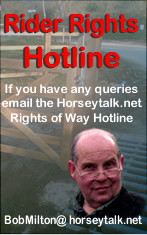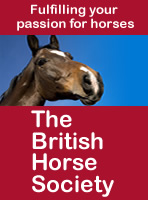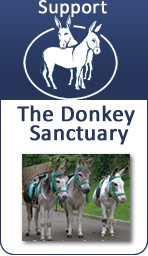
Horseytalk.net/Hoofbeat EXCLUSIVE
RIDER RIGHTS

Be warned. The Government is planning a change to the Highways Act gating procedures which would allow landowners to gate byways and restricted byways.
Object NOW
If this goes through, byways and restricted byways all over the country will be at risk of being gated with grazing animals introduced in locations that have never previously been gated or grazed, Horse riders and carriage drivers are at risk of loosing many of their familiar routes as, even though the right to use the right of way remains, riders and drivers may not wish to pass through linear enclosures where sheep, cattle, pigs or horses may be present.
Says Sylvie Ballard
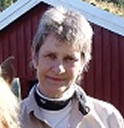 I live in Suffolk and in several locations gates, and sometimes cattlegrids, have been erected on bridleways as part of conservation grazing projects. For example, when the landscape restoration project in Dunwich Forest, a partnership between the Forestry Commission, the RSPB, and the Suffolk Wildlife Trust, supported by English Nature and the County Council, proposed to gate and grid a bridleway and a customary access route with an outstanding byway claim, it was the local riders who alerted the project officers to the need to apply for the gates under the Highway Act and that cattle grids could not be installed on a bridleway.
I live in Suffolk and in several locations gates, and sometimes cattlegrids, have been erected on bridleways as part of conservation grazing projects. For example, when the landscape restoration project in Dunwich Forest, a partnership between the Forestry Commission, the RSPB, and the Suffolk Wildlife Trust, supported by English Nature and the County Council, proposed to gate and grid a bridleway and a customary access route with an outstanding byway claim, it was the local riders who alerted the project officers to the need to apply for the gates under the Highway Act and that cattle grids could not be installed on a bridleway.
After protracted negotiations, easy opening bridleway gates were authorised by the County Council on the bridleway, with cattle grids off the definitive alignment to the side as a bypass for private vehicles.
On the customary route, cattle grids were installed on the vehicular track, with easy opening bridleway gates to the side as a bypass. This arrangement satisfied the concerns of most of the local equestrians, although some riders now avoid this area because of concerns about the gates and also the herd of free range ponies in the gated enclosure.
I also am involved with riding friends in Cambridgeshire who have been battling to save their unrestricted access to definitive and customary bridleway and byway routes in and around the National Trust's Wicken Fen Vision project area.
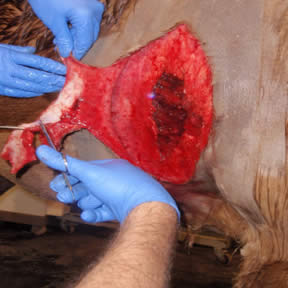 This project has attempted to gate and cattle grid a byway, an unclassified road, and is now attempting the same on a bridleway. Each of these examples are on land not owned by the National Trust. The local communities have objected vigorously to each of these attempts, with little support from the County Council, and it is only by sheer force of objection that these routes have remained unobstructed by gates and cattle grids. The National Trust are also running herds of 'wild' ponies in the enclosures, including many stallions that can often be seen sparing and fighting. Problems also arise when the stallions attempt to recruit mares or fight off geldings that are being ridden on the right of way.
This project has attempted to gate and cattle grid a byway, an unclassified road, and is now attempting the same on a bridleway. Each of these examples are on land not owned by the National Trust. The local communities have objected vigorously to each of these attempts, with little support from the County Council, and it is only by sheer force of objection that these routes have remained unobstructed by gates and cattle grids. The National Trust are also running herds of 'wild' ponies in the enclosures, including many stallions that can often be seen sparing and fighting. Problems also arise when the stallions attempt to recruit mares or fight off geldings that are being ridden on the right of way.
Research on the internet shows that these conservation grazing projects are causing problems to equestrians all over the country, with gates and cattle grids being installed often without authorisation from the Highway Authority. Self closing gate mechanisms like rat traps are causing horrific accidents to horses attempting to pass through the gates, and cattle grids that often obstruct the right of way are causing accidents to ridden horses as well as the grazing stock.
See http://horseytalk.net/ROW.html and
http://www.savepenwithmoors.com/2012%20carnyorth%20stockproofing.pdf
for
a selection of problems caused by conservation grazing projects.
Why is all this suddenly happening? Funding is available for conservation projects from various sources including Stewardship schemes - government funded payments involving the Rural Payments Agency and supported by DEFRA and English Nature. The decision makers, both from the government funding organisations and also the conservation project managers, are not necessarily familiar with Highways Law as it relates to rights of way, resulting in funding being given to conservation projects for the introduction of conservation grazing without the necessary authority to erect gates and cattle grids on public rights of way being considered.
At present a landowner may apply for a gate on a footpath or bridleway under Section 147 of the Highway Act 1980. There is no provision in the Highways Act to install a new gate on a restricted byway or byway - for obvious reasons. The 'traffic' (horseriders, carriage drivers and cyclists as well as pedestrians) on restricted byways and BOATS would be unduly inconvenienced by such gates. Imagine the outcry if gates were erected on the road outside your home!
Unobstructed access to the highway (including byways, restricted byways, bridleways and footpaths) is enshrined in law. That is why it is necessary for landowners to apply to erect gates under the Highways Act 1980, and any resulting structures must be 'without undue inconvenience to the public'.
Only a small percentage of rights of way are available to equestrians compared to the routes available to walkers, making the preservation of our unubstructed access critical.
On 16 May DEFRA released a consultation proposing 'improvements' to certain aspects of rights of way law.
See http://www.defra.gov.uk/consult/2012/05/14/improve-rights-of-way/ .
Hidden within the consultation document http://www.defra.gov.uk/consult/files/crow-consult-doc-120116.pdf is a change to the Highways Act gating procedures which would allow landowners to gate byways and restricted byways! See paragraph 5.11.
5.11. “It should be possible for an owner to apply to a highway authority for authority to erect new gates on restricted byways and byways open to all traffic in line with existing provisions for their erection on footpaths and bridleways”. (Proposal 32). The lack of provision for byways to be gated is often a reason for claims being disputed by landowners, particularly where the right of way is at odds with the current land use patterns and this causes difficulty with livestock control. Currently, section 147 of the Highways Act 1980 empowers local authorities to approve the installation of gates on any footpath or bridleway, provided the right of way can be used without undue inconvenience to the public. Similar provision could be made for byways, but the concept of ‘undue inconvenience to the public’ may need to be redefined for this context.
If this goes through, byways and restricted byways all over the country will be at risk of being gated with grazing animals introduced in locations that have never previously been gated or grazed, Horse riders and carriage drivers are at risk of loosing many of their familiar routes as, even though the right to use the right of way remains, riders and drivers may not wish to pass through linear enclosures where sheep, cattle, pigs or horses may be present.
Please circulate this information to all your bridleway group, equestrian and cycling friends and urge them to respond. Also lobby your local Parish and District Councils in areas where the gating of rights of way is a current problem. You can lobby your MP too! Closing date for response in 6 August 2012.
How to respond
Please submit your comments by 6 August 2012
in any of the following ways:
Email: RightsofwayReforms@defra.gsi.gov.uk
Post: Defra, Reform Projects Team, Zone 1/09, Temple Quay House, 2 The Square, Temple Quay, Bristol, BS1 6EB.
The sustained erosion, by unlawful means, of public access is done within an environment of legal immunity
The aim is to restrict access to maximise Euro revenue and the fact that consideration is being given to a law that will further degrade public access gives a clear indication of the 'lobbying' power of NE(and buddies) as opposed to the representation we ALL anticipate when voting!!
Says Steve Yandall
 The questions arising must be "are current attempts to circumvent the law in anticipation of the proposed changes" or " is the law being changed to facilitate impositions that raise too many public concerns?".
The questions arising must be "are current attempts to circumvent the law in anticipation of the proposed changes" or " is the law being changed to facilitate impositions that raise too many public concerns?".
It has ALWAYS been clear, to many of us, that the whole HLS agenda has had a subtext of exclusion going back to 1997 when contractual clauses were removed from a £14m HLF support application that resulted in NE(EN then) not having to seek public approval or make allowances for the disabled(source VERITA).This resulted in plans becoming actions without general public knowledge--imposition.
Either way the aim is to restrict access to maximise Euro revenue and the fact that consideration is being given to a law that will further degrade public access gives a clear indication of the 'lobbying' power of NE(and buddies) as opposed to the representation we ALL anticipate when voting!!
We thus have a situation within which little action is being taken to support the current law or reign in those flouting it whilst the establishment suggest changes that,in turn,work against public interest and are likely to be unequally selective in 'the eyes of the law'.
Multiple examples exist of access abuse so where are the letters from authorities/ministers clarifying to their major national 'imposers' the current legal situation and demanding a halt to unlawful activities?Where is the support for the legally prescribed rights of the disabled?Where is the support for Common Land Law that is being flouted by our representatives?
The answer is that the sustained erosion,by unlawful means,of public access is done within an environment of legal immunity--a challenge to the whole basis of legal equality and a very good reason to oppose legal changes that facilitate current abuses!
The means exist to achieve biodiversity objectives, without access impositions(in many cases), but the means to access funding for alternative systems does not exist thus public access is being forfeited to compensate for very poor strategic planning that failed to consider the full panoply of environmental benefits and the collateral damage to access,tourism,archaeology,localism and,ironically,biodiversity through poorly resourced support functions for inexperienced stewards.
QUANGO's,LA's and NGO's are in conflict with democracy,equality and long held freedoms thus widening the issue of "rural access" to one of representation,justice and accountability.
Our turn,I believe,to level the NIMBY accusation against the 'imposers'? "ACCESS---NOT IN MY BACK YARD(while I am being paid your money by Europe for the next 10 years)".
HLS is for 10 years the law is,possibly, forever so please register your objection to any easement that trades off your rights against a scheme with no guarantees other than an erosion of public benefit.

